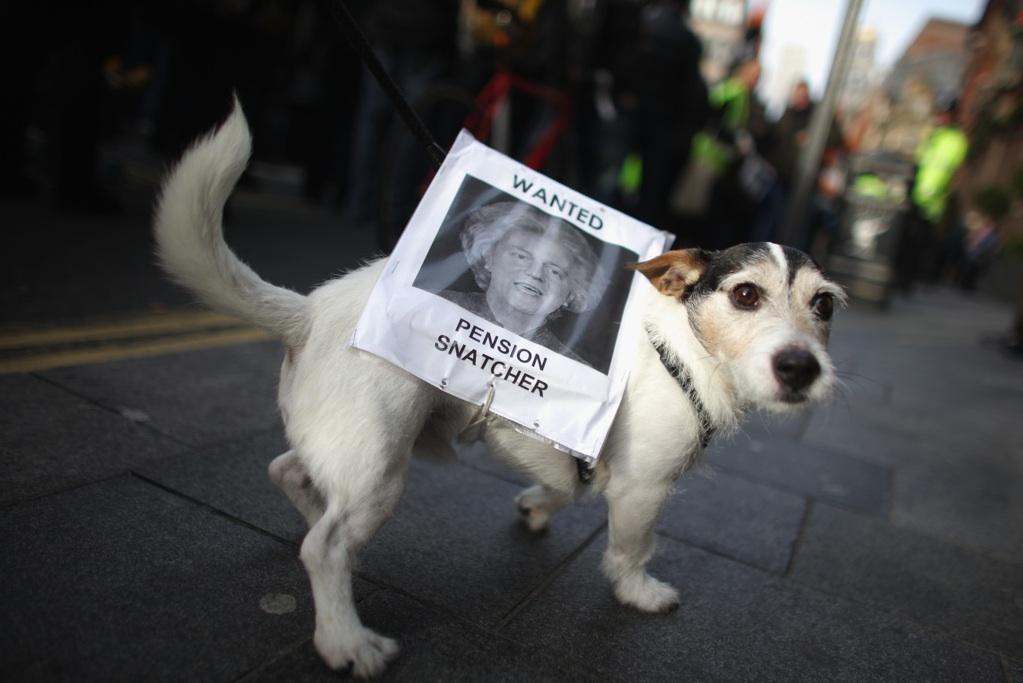Massive strike shuts down United Kingdom
Pet dog Milo walks with a sign during a march for the public sector strike on November 30, 2011 in Liverpool, UK. More than 2 million public sector workers are staging a nationwide strike over cuts to their public sector pensions.
LONDON, England — An estimated 2 million British public sector workers are staging a one-day strike today. It's the largest industrial action in this country for more than thirty years.
With around one in six British workers employed in the public sector, every aspect of British life is affected. Teachers, immigration officers, librarians, hospital staff, emergency services personnel and clerical workers are on the picket line, or have joined one of the dozens of protest marches all over the country.
They are protesting government plans to alter their pensions. The proposed changes would make them work longer and contribute more of their own money to the system. It would also base pension payments on average earnings over their working life rather than their final salary.
Austerity: Britain isn't working or growing
The government says that as people live longer, the existing pension setup is unsustainable and needs reform. At Question Time today, British Prime Minister David Cameron said, "The reason people are going on strike is they object to our reforms. Those reforms are absolutely essential."
The strike covers all of the UK. Hardest hit is Northern Ireland, where an estimated 200,000 people are on strike, nearly one in six adults of working age. In Scotland virtually all public schools are shut down because the union representing principals is joining the strike.
In England, three-quarters of schools, more than 21,000, are closed. An estimated 60,000 non-essential hospital operations have been canceled.
However, the much ballyhooed disruption at Heathrow airport — where tens of thousands of people are processed by immigration officials each day — has not happened, in part because many people changed their travel plans, and in part because senior civil servants have taken the place of strikers.
There is a Sunday morning quiet in residential neighborhoods around London, where an estimated 2,000 schools are shut. At 9:00 a.m. streets that are usually screeching with children are eerily quiet.
Austerity bites Britain’s military budget
Outside the gates of Stoke Newington High School, around 25 teachers and auxiliary staff formed a picket line. Jane Bassett, an English teacher with 25 years experience, says she plans to retire at 60 after 35 years on the job. But under the proposed new rules, her colleagues in their early 30's will not be able to retire and collect their pensions until they are 67 or 68. "It's difficult to imagine standing in front of a class of high school students at that age," she laughs.
Bassett explained that she currently pays 3 percent of her salary into her pension. Under government plans, that would rise to 6 percent over the next three years. What angers Bassett and other teachers is that the contributions over a longer period do not mean a larger pay out at the end of their working life. They say the money is going to be used to pay down Britain's deficit.
Bassett sees today's walkout as a way of getting the government to be more serious in its negotiations. "We had a one day strike in June but it was just teachers," she says. "But now with all the public sector unions going out, it will hopefully bring public pressure for more serious negotiations."
Around the corner at Stoke Newington Town Hall, a small group of council workers is picketing, acknowledging the honking horns of passing motorists.
Adam Farrell, 24, a youth worker who has just started a job at the Hackney Council says his interest in going on strike didn't have much to do with his pension, which seems a very distant prospect. "The reason why I was so eager to protest is the ideological nature of the government's cuts," he explains. "It attacks the most vulnerable in society and also the fact that the financial sector haven't paid their dues for the state of the economy."
But can a one-day strike really make a difference?
"I don't think they will back down on the basis of one day strike," acknowledges schoolteacher Bassett. "We have to put pressure on our [union] leaderships to consider more concerted action."
Euro zone: Growth first, austerity later
Adam Farrell says the gesture does have meaning. "One day allows time for people to take stock about the dangerous situation we are in."
Certainly, public sector workers are living through difficult times. The strike comes a day after they learned they would be taking a severe hit financially over the next five years, as Britain's Conservative-led coalition government pursues its austerity plans.
Yesterday Chancellor of the Exchequer George Osborne announced that the current freeze on public sector pay would continue until the end of 2012 and that it would be capped to 1 percent a year for the following two years. With inflation currently over 5 percent, union leaders claim that means a real-term pay cut of around 15 percent over the next five years.
In addition, the Office of Budget Responsibility, a government funded independent provider of economic statistics, predicts that cuts to various government programs means 700,000 public sector workers will lose their jobs during the same period.
Every day, reporters and producers at The World are hard at work bringing you human-centered news from across the globe. But we can’t do it without you. We need your support to ensure we can continue this work for another year.
Make a gift today, and you’ll help us unlock a matching gift of $67,000!
